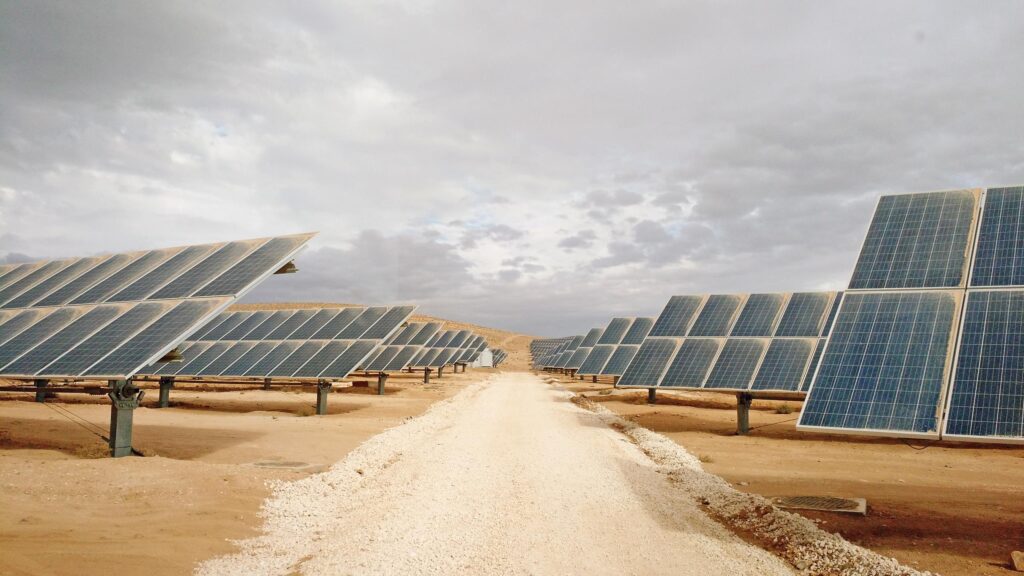A recent report by Global Energy Monitor was issued on Tuesday, July 19, stating that the total renewable energy in the Arab world amounts to 73.4 gigawatts, concentrated in particular in solar and wind energy.
By: Hanin Abu Alrub
Head of Media Department – National Center for Environmental Justice
The report showed that Jordan is not among the leading energy-producing countries, despite the existence of spaces and capabilities that support such projects throughout the Kingdom. The report showed that Egypt, Morocco, the UAE, and Saudi Arabia are the first in the production of wind energy, where such projects enjoy great government support, as well as the support of donors working on projects that aim to serve humanity.
Recent statistics on renewable energy in the Arab region also showed that the UAE leads the Arab countries in generating electric power from solar energy, followed by Egypt, Morocco, and Jordan, then Algeria, Yemen, Tunisia, Saudi Arabia, Mauritania, and Kuwait in the tenth place. All official authorities in the Arab countries have called for the need to pay attention to the energy crisis and the high cost of fuel, and consequently the constant push and direction to accelerate plans to find alternative, clean, and renewable energy sources instead of traditional fuels coming from fossil fuels.
With a realistic study of the situation in Jordan, we find that the rapid population growth resulting from the annual increase in the number of refugees has undermined the efforts to upgrade the economy and the plans set by successive governments to get the Kingdom out of the dangerous economic bottleneck.
Jordan is still suffering from the economic challenges caused by the COVID-19 pandemic, so it was necessary to try to find solutions and alternatives for a country that depends for its energy on what it imports from neighbouring countries or exports to others. growth of the local economy.
Jordan has gone through the steps of developing the Master Energy Strategy 2007-2020, which called for an increase in the use of domestic resources, including renewable energy, as the share of electricity from renewable energy sources in Jordan grew from 0.7% in 2014 to more than 13% in 2019, making Jordan a regional leader in renewable energy.
On the other hand, we find that the government’s decision to impose fees on renewable energy has angered a large segment of citizens, which some see as a threat to government plans to raise the share of clean electricity to 50% by 2050, which the government justified that imposing fees on renewable energy users is part of a restructuring The energy in use, removing distortions and reducing the number of segments, and that the financial surplus will be directed to other economic sectors.
The state has put in place the necessary policies and regulations to support renewable energy sources, including solar photovoltaic energy, the development of onshore wind energy and energy from re-refining.
As for the updated main strategy for the energy sector 2020-2030 developed by the Ministry of Energy and Mineral Resources, it calls for the creation and development of sustainable future energy resources, increasing dependence on local resources and in return reducing dependence on electric energy in its current form to overcome the huge cost of electricity supply, so the strategy aims to raise the share of renewable energy from Total power generation capacity to 30% by 2030.

The future is very promising for renewable energy projects in the Arab world, given the enormous capabilities of the Middle East and North Africa region to establish giant projects for the production of wind and solar energy, and despite our belief that Jordan, despite its lack of land resources with oil, is very rich in its human resources and ability to deal with a change in lifestyle.
And if we look at Jordan’s call for the need for concerted efforts and construction in the matter of linking all countries of the world to a single electrical network to facilitate the transfer of green energy from countries that have a high capacity to produce it, to countries that look forward to this energy, which reduces costs and generalizes benefits to all, within Jordan’s vision It is time to move towards the technology of producing and using green hydrogen produced from renewable energy sources, which plays a key role in reducing carbon emissions, in addition to using it as a medium for transporting and storing clean energy. Developing the energy sector between Jordan and the World Bank, which amounted to $500 million.
We can say that just as oil was once a powerful weapon for the advancement of the Arab region, its location and areas are also capable of turning it into a source of renewable energy, which will be a logical alternative to the current forms of fuel and its waste that poses a threat to the environment and nature in general and climate change primarily.






